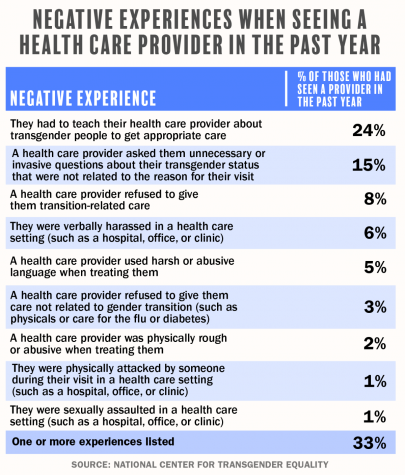Getting in the room: Finding gender-affirming health care
March 5, 2020
Editor’s note: This is the first installment of The Daily Texan’s semester-long collaborative series, The Waiting Room, which explores stories of how health care coverage is impacted by your identity. Stories will be produced in partnership with UT’s chapters of the Asian American Journalists Association, National Association of Black Journalists, National Hispanic Journalists Association and the National Lesbian Gay Journalists Association, as well as other organizations.
Sloan Touchet said he is the only transgender person he knows with a mostly positive health care experience.
“I have been so lucky to have great health care,” said Touchet, a transmasculine queer person. “Every other trans person I know has some horror stories about doctors being very invalidating of gender.”
Touchet, a Plan II and philosophy sophomore, said his queer parents ensured he received gender-related care from a trans-specific clinic at the Children’s Medical Center Dallas, one of a handful of gender-affirming health care facilities in Texas.
“Because my parents have been supportive, I think doctors don’t want to f— with me, because if they f— with me, my parents will stop taking me to them,” Touchet said. “When I first came out … I could tell (my pediatrician) didn’t super like it, but by the time I turned 18, she was cool.”
For transgender people across the United States, accessible and gender-affirming health care is difficult to come by due to stigmas and financial barriers. One barrier is health insurance — 19% of transgender people don’t have any form, according to GLAAD, the Gay and Lesbian Alliance Against Defamation.
Touchet said he considers himself unique due to his supportive family and health insurance. According to the 2015 U.S. Transgender Survey report, 23% reported not visiting a doctor due to fear of mistreatment. Of those who did see a doctor, a third reported at least one negative interaction, including refusal of treatment and having to teach providers about being transgender to receive proper care.

Sierra Wiggers | The Daily Texan
Amanda Pollitt, a postdoctoral research fellow at UT, said LGBTQ+ people face higher risks for mental and physical health issues because of their gender and sexual identities, citing the minority stress model.
The model, developed by Ilan Meyer in 2003, explains how lesbian, gay and bisexual people experience greater stressors including discrimination, internalized homophobia, expectation of rejection and concealment. Pollitt said this theory also includes gender minority people, or people who do not identify with their gender assigned at birth.
Touchet said he has been in therapy since sixth grade for general mental health, and he began gender-related therapy in high school with a therapist who works primarily with transgender people.
“Again, very lucky in terms of therapy,” Touchet said. “Everybody needs (therapy), but especially if you’re trans because there’s a lot of trauma that comes with being trans, and you need to cope with that.”
When transgender people receive gender-affirming treatment, GLAAD reports that suicide rates drop from 19%-29% to 0.8%-6% after treatment.
Pollitt, who is a bisexual woman, said LGBTQ+ youth face potential negative health impacts because of familial rejection.
“Kids before college (are) dependent on their families for food (and) health care,” Pollitt said. “If you’re rejected by your family, you’re vulnerable because of that. The good news, though, is that for LGBT kids who go to college, there’s a support system … for the most part, like staying in the dorms (and) on-campus health.”
UT students can access health care through University Health Services, including the continuation of hormone therapy that has occurred for at least one year and testing for sexually transmitted disease testing. The 2015 U.S. Transgender Report survey found that 78% of respondents wanted gender transition-related hormone therapy, but only half ever receive it.
Touchet said he has had positive experiences when getting tested for STDs from UHS, but he believes this is because people view him as a cisgender man.
“(UHS has) been pretty good about affirming my gender, but that’s also because I’m read as cis(gender),” Touchet said. “It’s easier to affirm a trans person’s gender if you don’t know they’re trans.”
Touchet said he feels gender invalidation when people do not know he is trans because he has been shamed for his gender throughout his life.
“I’m in a position now where I’m so immensely proud of my transness and the fact that I’ve done all this s— that I’ve been able to do with the gender trauma stacked on top of it,” Touchet said. “Like, that’s impressive. That’s really f—ing cool.”
For those seeking gender-affirming health care, resources and support can be found at the Central Texas Transgender Health Coalition and the KIND Clinic.












